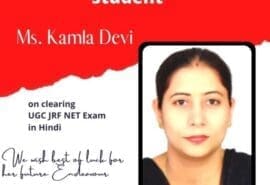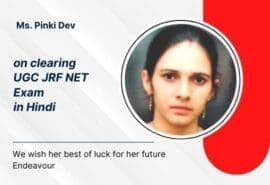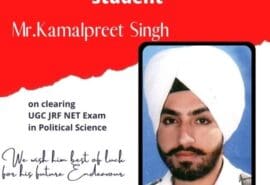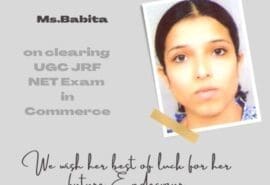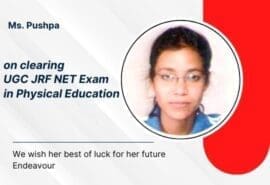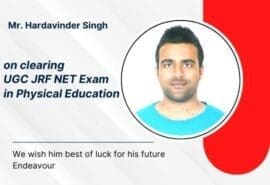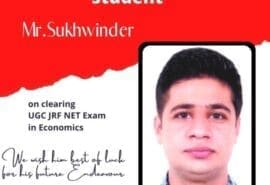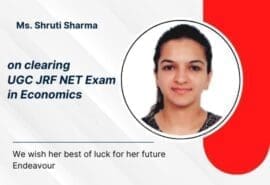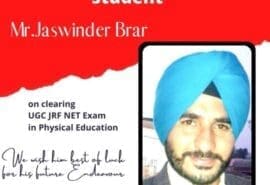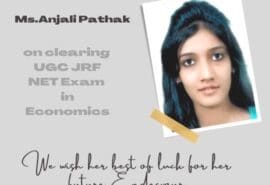
Topic-wise Analysis for JRF NET Sociology Success
Topic-wise Analysis for JRF NET Sociology Success
The UGC NET for the award of Junior Research Fellowship and eligibility for Assistant Professor roles in sociology poses a highly competitive exam with a vast syllabus, dismally low clearing rates and over 50,000 aspirants vying annually.
Hence, adopting strategic topic-wise preparation based on scientific analysis of the previous year's question papers can hugely improve Success chances amid this challenge.
Analyze Past Papers
Review previous ten years' NET papers to gauge subject weightage, frequent question types around key topics, and derivable patterns in core areas examined year-on-year without fail versus peripheral stuff.
For guiding revision, prepare matrices mapping such high probability versus moderately and least visible topics from past papers. Also, analyze questions posed - theory/concept-based, applied, data interpretation, compare & contrast, etc.
Master Core Concepts
With over 300 distinct concepts spanning culture, hierarchy, demography and structure-agency debates, thoroughly grasp technically accurate definitions and interpretations around seminal notions like anomie, patriarchy, labeling, social cohesion, alienation, secularization, etc. Memorize concepts accurately from readings for precise usage in applied responses on caste systems or consumerism.
For UGC JRF NET Sociology Exam Preparation Coaching, contact us at Mantram Study Group, SCO No. 80-81, First Floor, Sector 15-D, Chandigarh (Near Gate No. 2, Panjab University Chandigarh – Contact – 9779797575/ 9463049859)
Focus on Indian Thinkers
Analysis evidences questions consistently assessing grasp of pioneering work by B.R. Ambedkar, G.S. Ghurye, M.N. Srinivas, Andre Beteille, Dipankar Gupta and Neera Desai regarding traditions of discrimination, modernization and marginalization. Hence, rigorously study their key theories on caste as a framework for thematic responses.
Learn Theories Thoroughly
Sociological theories like Functionalism, Marxism and Symbolic Interactionism provide intellectual paradigms to examine behaviours, social conflicts and cultural phenomena. Learn original texts of Durkheim, Marx, Weber, and Du Bois, plus modern adaptations and evaluations of their continued relevance to accurately apply theoretical reasoning for analytical tasks.
Internalize Research Methods
With over 15% of the syllabus weight around research techniques, systematically understand comparative analysis, ethnographic accounts, interviews, statistical datasets, analytical procedures, etc. Identify sample journal studies clarifying methodological nuances for enhanced exam clarity on tools like surveys and interviews.
Indian Sociology Foregrounded
The analysis underlines the focal significance of topics within the Indian sociology subdomain encompassing caste hierarchies, discrimination, minority marginalization and similar sociocultural patterns for around 20 marks annually.
Hence, substantially preparing thinkers, theories, and data-based works dissecting Indian social groups proves vital.
Attempting Previous Papers
Attempt entire past papers replicating exam conditions for score projections based on section-wise performance, helping diagnose strong and weak areas.
Spot previously unseen question types around newer sociological issues and derive insights into the latest testing preferences on areas like celebrity culture or social media analysis.
Handpick Supplementary References
Rather than all suggested readings, handpick 2-3 recent supplementary references closely mirroring updated syllabus priorities like gender identities or globalization for condensed revision material curated toward emerging paper trends evident through analysis.
Conclusion
In summary, topic-wise dissection of previous NET sociology papers helps determine high probability question areas, frequent analytical styles in framing problems and shifting emphasis on issues flagged by paper setters for guiding the optimal direction of preparation efforts. This analysis aligns constrained time resources toward topics consistently assessed year-on-year for maximizing exam Success possibilities amid fierce competition.
Thanks for visiting our website Mantram Study Group
CHECK OUR OTHER LINKS: -
Testimonials
 Their passion for teaching and extensive knowledge of the subject matter shines through in their engaging lectures and interactive class sessions. Students can grasp complex concepts and excel in their exams with their guidance. The CSIR Life Science Coaching Academy's commitment to students' success is evident in its teaching methodology.
Their passion for teaching and extensive knowledge of the subject matter shines through in their engaging lectures and interactive class sessions. Students can grasp complex concepts and excel in their exams with their guidance. The CSIR Life Science Coaching Academy's commitment to students' success is evident in its teaching methodology.


